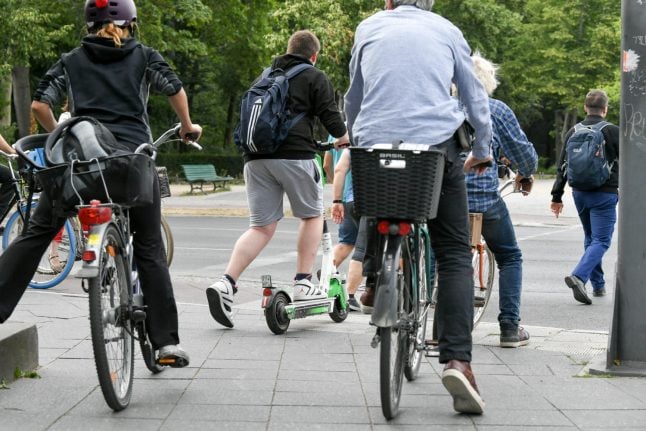According to police there have been several accidents on roads and pavements across Germany. In Berlin at least seven serious accidents have occurred so far. Those involved have suffered broken bones and head injuries.
E-scooters have been appearing on streets across Germany since the government gave them the go-ahead in May. Local broadcaster RBB revealed this week there are already 4,800 e-scooters in Berlin.
READ ALSO: Impatient train passenger takes electric scooter onto German Autobahn
Frankfurt and Hamburg have reported a handful of accidents, while there’s been at least six incidents in Munich so far. In Stuttgart, authorities said they had not been made aware of any accidents.
“This shows how dangerous driving an electric scooter is and how underestimated it is by some,” Christian Kellner, general manager of the German Road Safety Council, told DPA.
It’s led to calls for helmets to be made compulsory for e-scooter riders. In Germany, it is optional to wear a helmet when riding an electric scooter or a bicycle.
“If the accident situation continues to deteriorate and more people with head injuries and fractures are admitted to hospitals, we need to consider compulsory helmets,” Kellner said. “Then the federal government together with the states would have to adapt the regulation accordingly.”
'Helmets won't fix problems'
However, Alexander Jung, senior associate in new mobility at Agora, which aims to promote the creation of a sustainable, climate friendly transport system, said he didn't think this was the way forward.
“I don’t see it coming in Germany to be honest,” he told The Local. “I don’t think helmets will be a fix to this problem.”
Jung said the focus should be on the amount of traffic on roads and not purely on the e-scooters.
“All the accidents we’ve seen so far in Germany have been related to accidents with cars,” he said.
“I also find it quite surprising that a car runs over a scooter rider then we call for stronger regulation of scooters. The actual problem is too much car traffic and too many private vehicles in the city.”
E-scooter users must stick to a speed limit of 20 kilometres per hour and be aged 14 years or older. The vehicles must be used on cycle paths – if there are none, users have to go on the road and avoid pavements.
 Should helmets be worn when riding an e-scooter? Photo: DPA
Should helmets be worn when riding an e-scooter? Photo: DPA
Jung added that the speed limit for e-scooters in Germany was already lower than other countries where it is around 25km/h, indicating that measures have already been taken to make the roads safer.
Instead of introducing compulsory helmets, Jung said better infrastructure for cyclists, which is shared by e-scooter riders, should be implemented.
“I think we need to work much more on the infrastructure for cycling and this is a win-win situation because it creates more safety for cyclists and riders of electric scooters,” he said. “That would be my suggestion.”
'Tripping hazards'
Road safety associations agreed that improved cycling infrastructure, such as extra cycle lanes, needs to be put in place.
But experts insist that more education on the risks involved with the two-wheeled craze is urgently needed.
“Everyone needs to know how to drive the vehicles, and when and which accident risks exist,” Kellner said.
READ ALSO: Will fines for electric scooter riders in Germany improve safety?
The manufacturers and sharing providers, who can provide information directly via the app that users book the scooters on, have been urged to step up their action and give out more safety tips.
Kellner added that pedestrians have also been facing problems. He said “carelessly parked e-scooters are tripping hazards on pavements”.
In addition, some electric scooter riders have already been hit with fines – often because they were caught riding under the influence.
A spokeswoman for the General German Automobile Club (ADAC) appealed to e-scooter users to behave responsibly.
“E-scooters are motor vehicles so the same strict rules apply as when driving a car,” an ADAC spokeswoman said.
The ADAC said it was positive that vehicle providers use their apps to give out additional safety information. But they could go even further – the ADAC suggested e-sharing companies could offer training to riders.
“It is in the interest of manufacturers and sharing firms that there is no e-scooter chaos in our cities,” said the spokeswoman.
With reporting by DPA



 Please whitelist us to continue reading.
Please whitelist us to continue reading.
Member comments